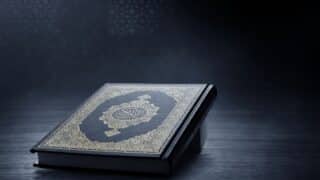The question about whether the Bible is the word of God is one with a simple answer, but it is unfortunately widely unrecognized by Christians and – more so – by Muslims. Let us first ask: “Is the current Christian Bible really the word of God?”
The Bible is a huge collection of “human” writings, 38 (+9 disputed) books comprising the Old Testament and 20 (+7 disputed) books of the New Testament. The Old Testament assortment includes books of history, proverbs, myths, legislation, etc., representing the popular literature of the Israelites. They were composed by many scribes, several centuries after the Prophet Moses, peace be upon him.
Similarly, the New Testament embodies the Gospels, four different biographies of the Prophet Jesus, peace be upon him, written by Matthews, Mark, Luke and John, whose identities are widely disputed. In addition, the New Testament contains the epistles of Paul, Peter and John. This is as well as the Acts – also due to Paul or Luke – and the Visions of John.
So, none of the Bible books can be claimed to be the word of God. It was the Nicea Council in the fourth century after Christ, who selectively sanctified these books to be “holy”, from among hundreds of other writings of the earlier Christians. While admitting the human authorship of these books, the churches claim and teach – without proof – that these human writings were “inspired” by God.
However, neither of the Bible authors themselves claimed, or probably even imagined that their books would ever be “holy”. Read for example:
“Forasmuch as many have taken in hand to set forth in order a declaration of those things …, Even as they delivered them unto us …; It seemed good to me also, having had perfect understanding of all things from the very first, to write unto thee in order, most excellent Theophilus …” (Luke 1:1-4)
“The book of the generation of Jesus Christ, the son of David, the son of Abraham.” (Matthews 1:1)
“The former treatise have I made, O Theophilus, of all that Jesus began both to do and teach.” (Acts 1:1)
“These be the words which Moses spake unto all Israel on this side Jordan in the wilderness …” (Deuteronomy1:1)
“Now after the death of Moses, the servant of the Lord, it came to pass that the Lord spake unto Joshua the son of Nun …” (Joshua 1:1)
“Now after the death of Joshua it came to pass, that the children of Israel …” (1 Judges 1:1)
“Now it came to pass in the days when the judges ruled …” (Ruth 1:1)
“Now it came to pass after the death of Saul, when David …” (2 Samuel 1:1)
“Now king David was old and stricken in years …” (1 Kings 1:1)
“Now in the first year of Cyrus king of Persia …” (Ezra 1:1)
“Now it came to pass in the days of Ahasuerus …” (Esther 1:1)
“Now it came to pass in the thirtieth year …” (Ezkiel 1:1)
Could any of these books be words of God, or rather typical human anecdotes and historical accounts?
Add to these facts the countless contradictions and obvious mistakes in the Bible text. As few examples, compare the following pairs:
“And again the anger of the Lord was kindled against Israel, and he moved David against them to say, Go, number Israel and Judah.” (2 Samuel:24:1V)
Please compare with:
“And Satan stood up against Israel, and provoked David to number Israel. (1Chr 21:1)
Also read:
“Therefore Michal the daughter of Saul had no child unto the day of her death.” (2 Samuel 6:23)
Please compare with:
“But the king took …; and the five sons of Michal the daughter of Saul, whom she brought up for …” (2 Samuel 21:8)
Then read:
“These be the names of the mighty men whom David had: … he lift up his spear against eight hundred, whom he slew at one time.” (2 Samuel 23:8)
Compare with:
“And this is the number of the mighty men whom David had: … he lifted up his spear against three hundred slain by him at one time. (1 Chronicles 11:11)
Also read:
“But the Syrians fled before Israel; and David slew of the Syrians seven thousand men which fought in chariots, and forty thousand footmen, and killed Shophach the captain of the host.” (1 Chronicles 19:18)
Compare with:
“And the Syrians fled before Israel; and David slew the men of seven hundred chariots of the Syrians, and forty thousand horsemen, and Samuelote Shobach the captain of their host, who died there. (2 Samuel 10:18)
Further, no rational mind could accept the false charges and shameless references to the great prophets, peace and blessings be upon them all, such as:
- Noah: getting drunk and naked in front of his sons. See Genesis 9: 20-24.
- Aaron: making a golden calf to worship. See Exodus 32: 3-4.
- Solomon: worshiping false gods, to please his large harem. See 1 Kings 11: 9-10.
- David: committing adultery. See 2 Samuel 11: 4-5.
- Lot: committing incest with his two daughters. See Genesis 19: 31-36.
Could such texts be inspired by God!
It can thus be concluded that the available Bible has nothing to do with the original Injeel of Jesus or Torah of Moses, both of which have disappeared, except in as much as traces of their texts might be part of the few sayings attributed to Moses and Jesus in the Bible. Still, it is difficult to decide which of these sayings are divine revelations and which are the teachings of the respective prophet.
Hence, it is an over-simplification to say that the available Bible is the word of God, corrupted by Man. Rather, it is almost A-Z a human text. Why then should not God allow the corruption of what His creatures invented?
Allah says in the Qur’an what means:
*{So woe to [the ones] who write the Book with their hands; thereafter they say, “This is from [the providence of] Allah.” That they may trade it for a little price; So, woe to those for what their hands have written, and woe to them for what they have earned.}* (Al-Baqarah 2: 79)
*{And who is more unjust than he who has fabricated against Allah a lie, or has said: “to me it has been revealed” and nothing has been revealed to him. And who has said: “I will send down the like of what Allah has sent down.”}*(Al-An`am 6: 93)
*by Nabil Haroun


















